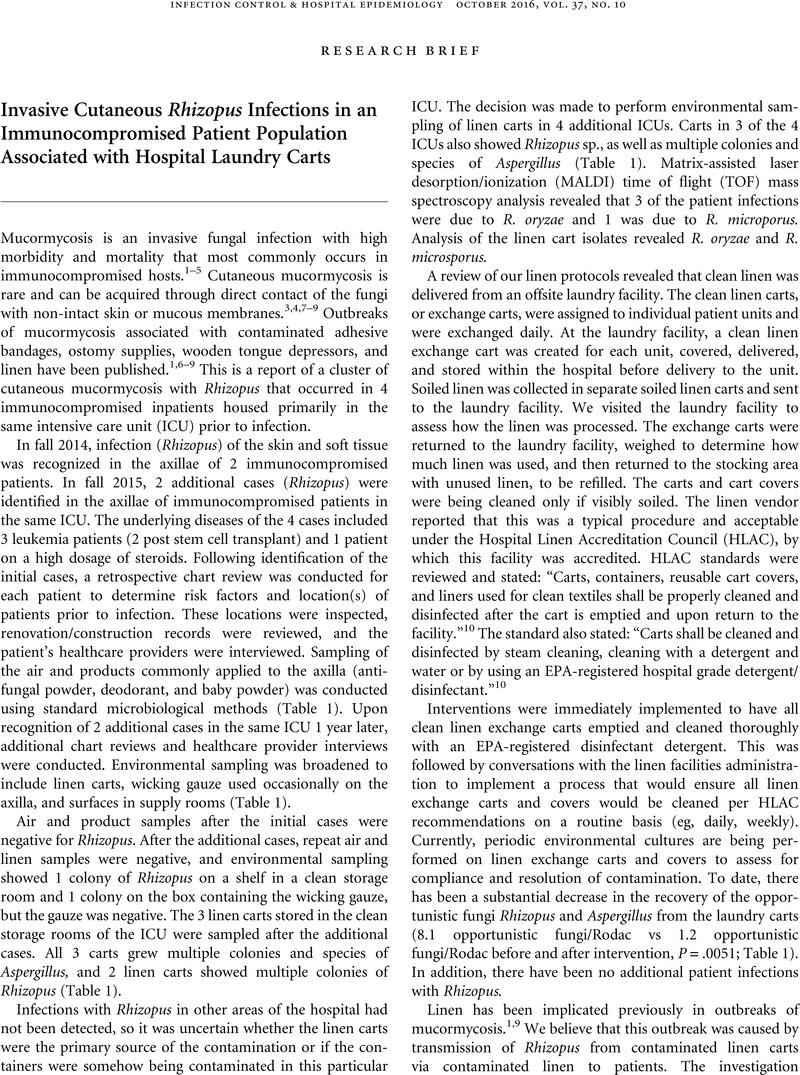Crossref Citations
This article has been cited by the following publications. This list is generated based on data provided by Crossref.
Kanamori, Hajime
Weber, David J.
Gergen, Maria F.
DiBiase, Lauren M.
Sickbert-Bennett, Emily E.
and
Rutala, William A.
2018.
Epidemiologic characteristics of health care–associated outbreaks and lessons learned from multiple outbreak investigations with a focus on the usefulness of routine molecular analysis.
American Journal of Infection Control,
Vol. 46,
Issue. 8,
p.
893.
Hartnett, Kathleen P.
Jackson, Brendan R.
Perkins, Kiran M.
Glowicz, Janet
Kerins, Janna L.
Black, Stephanie R.
Lockhart, Shawn R.
Christensen, Bryan E.
and
Beer, Karlyn D.
2019.
A Guide to Investigating Suspected Outbreaks of Mucormycosis in Healthcare.
Journal of Fungi,
Vol. 5,
Issue. 3,
p.
69.
Spellberg, Brad
and
Maertens, Johan
2019.
Principles and Practice of Transplant Infectious Diseases.
p.
577.
Sundermann, Alexander J
Clancy, Cornelius J
Pasculle, A William
Liu, Guojun
Cumbie, Richard B
Driscoll, Eileen
Ayres, Ashley
Donahue, Lisa
Pergam, Steven A
Abbo, Lilian
Andes, David R
Chandrasekar, Pranatharthi
Galdys, Alison L
Hanson, Kimberly E
Marr, Kieren A
Mayer, Jeanmarie
Mehta, Seema
Morris, Michele I
Perfect, John
Revankar, Sanjay G
Smith, Becky
Swaminathan, Sankar
Thompson, George R
Varghese, Merin
Vazquez, Jose
Whimbey, Estella
Wingard, John R
and
Nguyen, M Hong
2019.
How Clean Is the Linen at My Hospital? The Mucorales on Unclean Linen Discovery Study of Large United States Transplant and Cancer Centers.
Clinical Infectious Diseases,
Vol. 68,
Issue. 5,
p.
850.
Walther, Grit
Wagner, Lysett
and
Kurzai, Oliver
2019.
Outbreaks of Mucorales and the Species Involved.
Mycopathologia,
Nguyen, M. Hong
Kaul, Drishti
Muto, Carlene
Cheng, Shaoji J.
Richter, R. Alex
Bruno, Vincent M.
Liu, Guojun
Beyhan, Sinem
Sundermann, Alexander J.
Mounaud, Stephanie
Pasculle, A. William
Nierman, William C.
Driscoll, Eileen
Cumbie, Richard
Clancy, Cornelius J.
and
Dupont, Christopher L.
2020.
Genetic diversity of clinical and environmental Mucorales isolates obtained from an investigation of mucormycosis cases among solid organ transplant recipients.
Microbial Genomics
,
Vol. 6,
Issue. 12,
Chen, Sharon C.-A.
and
Slavin, Monica A.
2020.
Emerging Transplant Infections.
p.
1.
Owen, Lucy
and
Laird, Katie
2020.
The role of textiles as fomites in the healthcare environment: a review of the infection control risk.
PeerJ,
Vol. 8,
Issue. ,
p.
e9790.
Pagano, Livio
Dragonetti, Giulia
De Carolis, Elena
Veltri, Giuseppe
Del Principe, Maria Ilaria
and
Busca, Alessandro
2020.
Developments in identifying and managing mucormycosis in hematologic cancer patients.
Expert Review of Hematology,
Vol. 13,
Issue. 8,
p.
895.
Chen, Sharon C.-A.
and
Slavin, Monica A.
2021.
Emerging Transplant Infections.
p.
1109.
Jordan, Alexander
James, Allison E
Gold, Jeremy A W
Wu, Karen
Glowicz, Janet
Wolfe, Frankie
Vyas, Keyur
Litvintseva, Anastasia
Gade, Lalitha
Liverett, Hazel
Alverson, Mary
Burgess, Mary
Wilson, Amy
Li, Ruoran
Benowitz, Isaac
Gulley, Trent
Patil, Naveen
Chakravorty, Rohan
Chu, Winston
Kothari, Atul
Jackson, Brendan R
Garner, Kelley
and
Toda, Mitsuru
2022.
Investigation of a Prolonged and Large Outbreak of Healthcare-Associated Mucormycosis Cases in an Acute Care Hospital—Arkansas, June 2019–May 2021.
Open Forum Infectious Diseases,
Vol. 9,
Issue. 10,
Glowicz, Janet
Benowitz, Isaac
Arduino, Matthew J.
Li, Ruoran
Wu, Karen
Jordan, Alexander
Toda, Mitsuru
Garner, Kelley
and
Gold, Jeremy A.W.
2022.
Keeping health care linens clean: Underrecognized hazards and critical control points to avoid contamination of laundered health care textiles.
American Journal of Infection Control,
Vol. 50,
Issue. 10,
p.
1178.
Overcash, Michael R.
and
Sehulster, Lynne M.
2022.
Estimated incidence rate of healthcare-associated infections (HAIs) linked to laundered reusable healthcare textiles (HCTs) in the United States and United Kingdom over a 50-year period: Do the data support the efficacy of approved laundry practices?.
Infection Control & Hospital Epidemiology,
Vol. 43,
Issue. 10,
p.
1510.
Welch, Geoffrey
Sabour, Andrew
Patel, Kushal
Leuthner, Kimberly
Saquib, Syed F.
and
Medina-Garcia, Luis
2022.
Invasive Cutaneous Mucormycosis: A Case Report on a Deadly Complication of a Severe Burn.
SSRN Electronic Journal ,
Sundermann, Alexander J
Clancy, Cornelius J
Pasculle, A William
Liu, Guojun
Cheng, Shaoji
Cumbie, Richard B
Driscoll, Eileen
Ayres, Ashley
Donahue, Lisa
Buck, Michael
Streifel, Andrew
Muto, Carlene A
and
Nguyen, M Hong
2022.
Remediation of Mucorales-contaminated Healthcare Linens at a Laundry Facility Following an Investigation of a Case Cluster of Hospital-acquired Mucormycosis.
Clinical Infectious Diseases,
Vol. 74,
Issue. 8,
p.
1401.
Seimandi, Gisela
Butassi, Estefanía
Di Liberto, Melina
Cordisco, Estefanía
Blanc, Alan
Sortino, Maximiliano
Svetaz, Laura
and
Derita, Marcos
2022.
Promising Antimicrobials from Natural Products.
p.
281.
Sanders, Lisa
Giannopoulos, Gina
Mikolajczak, Anessa
Sotelo, Mary Anne
Bardowski, Laura
Silkaitis, Christina
and
Helms, Angela
2023.
Incorporating structured linen oversight into an infection prevention program.
American Journal of Infection Control,
Vol. 51,
Issue. 3,
p.
343.
Douglas, Abby P.
Stewart, Adam G.
Halliday, Catriona L.
and
Chen, Sharon C.-A.
2023.
Outbreaks of Fungal Infections in Hospitals: Epidemiology, Detection, and Management.
Journal of Fungi,
Vol. 9,
Issue. 11,
p.
1059.



